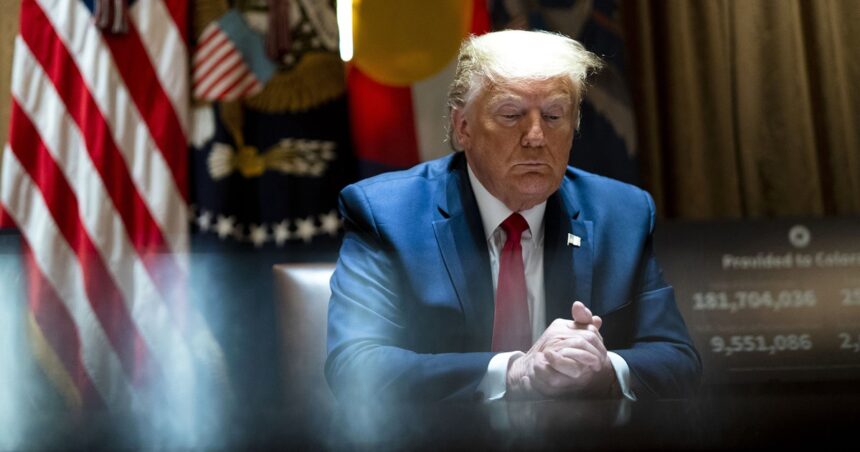In a bombshell decision, Colorado’s Supreme Court on Tuesday ruled that former President Donald Trump‘s candidacy in the state’s primary next year is prohibited on constitutional grounds.
The first-of-its kind ruling stems from a lawsuit that focused a little-known provision in the 14th Amendment of the U.S. Constitution. Similar challenges in other states have proven unsuccessful.
“A majority of the court holds that President Trump is disqualified from holding the office of President under Section Three of the Fourteenth Amendment of the United States Constitution,” the Colorado ruling said. “Because he is disqualified, it would be a wrongful act under the Election Code for the Colorado Secretary of State to list him as a candidate on the presidential primary ballot.”
In its opinion, the court explicitly stated that Secretary of State Jena Griswold “may not list President Trump’s name on the 2024 presidential primary ballot, nor may she count any write-in votes cast for him.”
The court put its decision on hold until Jan. 4 to allow for further appeals. It also said that if the matter is pursued before the U.S. Supreme Court before that date, the pause will remain in effect during that time and Colorado will be required to include Trump’s name on the primary ballot pending action by the Supreme Court.
Steven Cheung, a spokesperson for Trump’s campaign, bashed the ruling and signaled that an appeal to the U.S. Supreme Court was forthcoming.
“Unsurprisingly, the all-Democrat appointed Colorado Supreme Court has ruled against President Trump, supporting a Soros-funded, left-wing group’s scheme to interfere in an election on behalf of Crooked Joe Biden by removing President Trump’s name from the ballot and eliminating the rights of Colorado voters to vote for the candidate of their choice,” Cheung said in a statement.
“We have full confidence that the U.S. Supreme Court will quickly rule in our favor and finally put an end to these unAmerican lawsuits,” he added.
Colorado’s GOP presidential primary is scheduled for March 5.
Alina Habba, Trump’s personal lawyer, said the ruling “attacks the very heart of this nation’s democracy. It will not stand, and we trust that the Supreme Court will reverse this unconstitutional order.”
Trump has called the efforts to keep him off the ballot “nonsense” and “election interference.” But at a campaign speech Tuesday night in Iowa, Trump made no mention of the Colorado decision.
In their 4-3 ruling, the Colorado judges said: “We do not reach these conclusions lightly. We are mindful of the magnitude and weight of the questions now before us. We are likewise mindful of our solemn duty to apply the law, without fear or favor, and without being swayed by public reaction to the decisions that the law mandates we reach.”
“We are also cognizant that we travel in uncharted territory,” they added.
The suit was filed on behalf of six Colorado voters by the left-leaning government watchdog group Citizens for Responsibility and Ethics in Washington and two law firms. Noah Bookbinder, the group’s president, said the ruling was “not only historic and justified, but is necessary to protect the future of democracy in our country.”
“Our Constitution clearly states that those who violate their oath by attacking our democracy are barred from serving in government,” he said in a statement.
The high court’s decision reverses a lower court’s ruling that said Trump had engaged in insurrection by inciting a riot on Jan. 6, 2021, but that presidents are not subject to Section 3 of the 14th Amendment because they are not an “officer of the United States.”
The majority of the state Supreme Court agreed with the lower court judge, Sarah B. Wallace, that Trump had engaged in insurrection, but rejected her finding that the president is not an officer of the country that elected him.
“Our independent review of the record in this case brings us to the same conclusion: President Trump incited and encouraged the use of violence and lawless action to disrupt the peaceful transfer of power,” Tuesday’s ruling said.
“The tenor of President Trump’s messages to his supporters in exhorting them to travel to Washington, D.C. on January 6 was obvious and unmistakable: the allegedly rigged election was an act of war and those victimized by it had an obligation to fight back and to fight aggressively,” the court wrote. “And President Trump’s supporters did not miss or misunderstand the message: the cavalry was coming to fight.”
In a dissenting opinion, Chief Justice Brian Boatright focused on the lack of any criminal conviction against the former president.
“In the absence of an insurrection-related conviction, I would hold that a request to disqualify a candidate under Section Three of the Fourteenth Amendment is not a proper cause of action under Colorado’s election code. Therefore, I would dismiss the claim at issue here,” he wrote.
Section 3 of the Civil War-era 14th Amendment says: “No person shall … hold any office, civil or military, under the United States … who, having previously taken an oath … as an officer of the United States, to support the Constitution of the United States, shall have engaged in insurrection or rebellion against the same, or given aid or comfort to the enemies thereof.”
Courts have ruled against similar efforts to get Trump banned from the ballot in Arizona, Michigan and Minnesota. The plaintiffs challenging Trump’s eligibility in Michigan filed an appeal to that state’s high court on Monday.
RNC Chairwoman Ronna McDaniel on Tuesday said the Republican Party will help Trump in his legal fight.
“This irresponsible ruling will be appealed to the U.S. Supreme Court and our legal team looks forward to helping fight for a victory,” she said on X. “The Republican nominee will be decided by Republican voters, not a partisan state court.”
The Colorado Republican Party, meanwhile, began fundraising off the court’s ruling in a post on X, asking supporters to help “keep Trump on the ballot and fight this election interference now.”




